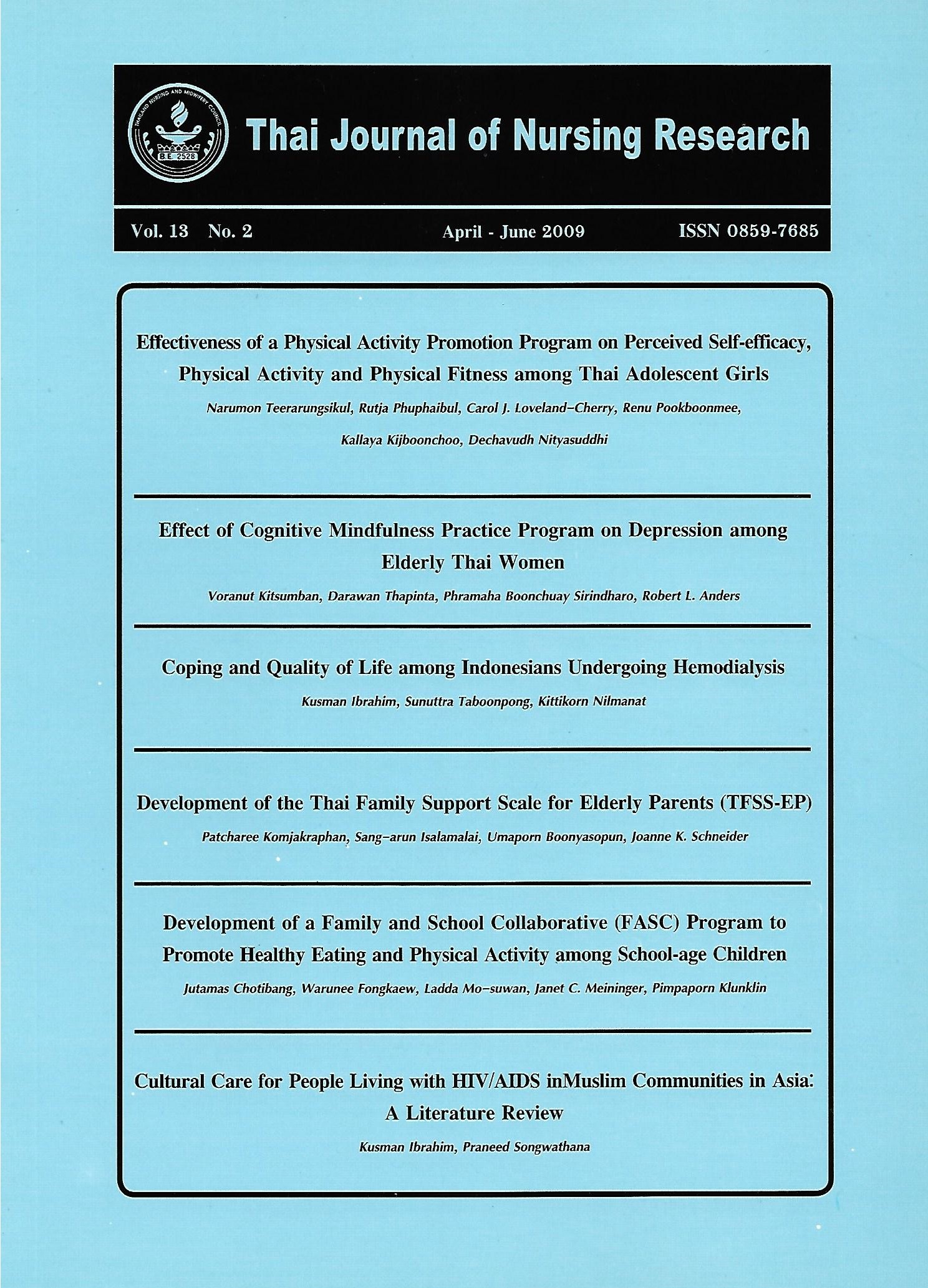Development of a Family and School Collaborative (FASC) Program to Promote Healthy Eating and Physical Activity among School-age Children
Keywords:
โปรแกรมความร่วมมือระหว่างครอบครัวและโรงเรียน, การส่งเสริมสุขภาพ, การบริโภคเพื่อสุขภาพ, กิจกรรมทางกาย, เด็กวัยเรียน, family and school collaborative program, health promotion, healthy eating, physical activity, school-age childrenAbstract
บทคัดย่อ
ปัญหาโภชนาการเกินหรือโรคอ้วนเป็นปัญหาสาธารณสุขสำคัญที่มีอัตราความชุกของโรคสูงและมีผลทางลบในระยะยาวต่อสุขภาพทั้งทางด้านร่างกายและจิตใจ บุคลากรในทีมสุขภาพจึงได้ให้ความสำคัญต่อการป้องกันและแก้ไขปัญหาโภชนาการเกิน ซึ่งในการศึกษาครั้งนี้มีวัตถุประสงค์เพื่อพัฒนาโปรแกรมความร่วมมือระหว่างครอบครัวและโรงเรียนเพื่อส่งเสริมการบริโภคเพื่อสุขภาพและกิจกรรมทางกายของเด็กวัยเรียนโดยใช้กลยุทธ์ในการส่งเสริมพลังอำนาจแก่ผู้มีส่วนได้ส่วนเสียทั้งหมด 110 คน วิเคราะห์ข้อมูลเชิงปริมาณโดยใช้สถิตเชิงพรรณาและวิเคราะห์ข้อมูลเชิงคุณภาพโดยใช้การวิเคราะห์เชิงเนื้อหา
ผลการศึกษาพบว่า เด็กวัยเรียนรับรู้แต่เพียงว่า ปัญหาเด็กอ้วนมีแนวโน้มเพิ่มขึ้น ส่วนกลุ่มผู้ปกครอง ครู แม่ครัวและพ่อค้าแม่ค้ารับรู้ในประเด็นอื่นด้วยว่าในปัจจุบันเด็กมีความเสี่ยงต่อการเกิดโรคอ้วนมากขึ้น และความอ้วนมีผลกระทบต่อสุขภาพเด็กและควรให้ความสำคัญกับโปรแกรมการป้องกันโรคอ้วน เนื้อหาของโปรแกรมความร่วมมือระหว่างครอบครัวและโรงเรียน ประกอบด้วย 5 ส่วน คือ การวิเคราะห์สถานการณ์ การศึกษาการดำเนินกิจกรรมที่มีประสิทธิภาพ การสร้างความร่วมมือของ ครอบครัวและโรงเรียน การดำเนินกิจกรรมตามแผนงาน การติดตามและประเมินผล และวิธีการสร้างการมีส่วนร่วมมี 4 วิธี คือการอภิปรายกลุ่ม การระดมสมองและการทำแผนที่ความคิด การประชุมกลุ่ม และการจัดกิจกรรมแบบมีส่วนร่วม
ผลกระทบที่เกิดขึ้นคือ เกิดความร่วมมือระหว่างครอบครัวและโรงเรียน ในการกำหนดนโยบายและการพัฒนาแนวทางการปฏิบัติและการปฎิบัติกิจกรรมในการป้องกันโรคอ้วน ได้แก่ การจัดสิ่งแวดล้อม ที่เอื้อต่อการส่งเสริมสุขภาพโดยห้ามขายน้ำอัดลมและขนมกรุบกรอบในโรงเรียน การพัฒนาหลักสูตรเพื่อส่งเสริมศักยภาพของแกนนำนักเรียน การส่งเสริมกิจกรรมทางกาย การจัดอาหารกลางวันและอาหารว่างเพื่อสุขภาพ การให้ความรู้เรื่องการป้องกันโรคอ้วน การเฝ้าระวังภาวะโภชนาการ และการพัฒนาระบบฐานข้อมูลสำหรับติดตามภาวะโภชนาการของเด็ก โปรแกรมความร่วมมือระหว่างครอบครัวและโรงเรียน ที่ได้พัฒนาขึ้นจากงานวิจัยครั้งนี้ พยาบาลและบุคลากรทีมสุขภาพสามารถนำไปใช้เป็นแนวทางในการสร้างความร่วมมือระหว่างครอบครัวและโรงเรียนเพื่อส่งเสริมการบริโภคเพื่อสุขภาพและกิจกรรมทางกายแก่นักเรียนในโรงเรียน โปรแกรมนี้ได้ให้วิธีการในการสร้างนโยบายสาธารณะเพื่อสุขภาพในการป้องกันโรคอ้วนในโรงเรียนอย่างยั่งยืนต่อไป
คำสำคัญ: โปรแกรมความร่วมมือระหว่างครอบครัวและโรงเรียน, การส่งเสริมสุขภาพ, การบริโภคเพื่อสุขภาพ, กิจกรรมทางกาย, เด็กวัยเรียน
Abstract
Childhood obesity, a serious public health concern, has a high prevalence with long-term negative physical and mental health consequences. Prevention and treatment of obesity are considered a priority among pediatric health care providers. This participatory action research, using empowerment strategies with 110 school stakeholders, aimed to develop a family and school collaborative program for promoting healthy eating and physical activity for school-age children. Quantitative data were analyzed using descriptive statistics, while qualitative data were subjected to content analysis.
The study findings revealed the program had five core components including: situational analysis, family and school collaboration, exploration of effective interventions, implementation of planned activities, and monitoring and evaluation. Methods of program implementation included: group discussions; brainstorming and mind mapping; group meetings; and, participatory workshops.
The impact of program implementation was evident, with family and school collaboration, in: initiating school policy, developing practical guidelines and implementing obesity prevention activities. Activities created a supportive environment by disallowing sale of sodas and unhealthy snacks; developing a curriculum for enhancing the capacity of student leaders; promoting physical activity; providing a healthy school lunch and snack menu; providing obesity prevention education; conducting child nutrition status surveillance; and, developing a database for tracking children’s status over time. The program could be used as a guideline for nurses and health care personnel to enhance partnerships, between families and schools, in order to promote healthy eating and physical activity in school-age children.
Keywords: family and school collaborative program, health promotion, healthy eating, physical activity, school-age children
Downloads
How to Cite
Issue
Section
License
Copyright: The Pacific Rim International Journal of Nursing Research, Thailand Nursing & Midwifery Council has exclusive rights to publish, reproduce and distribute the manuscript and all contents therein.








.png)



